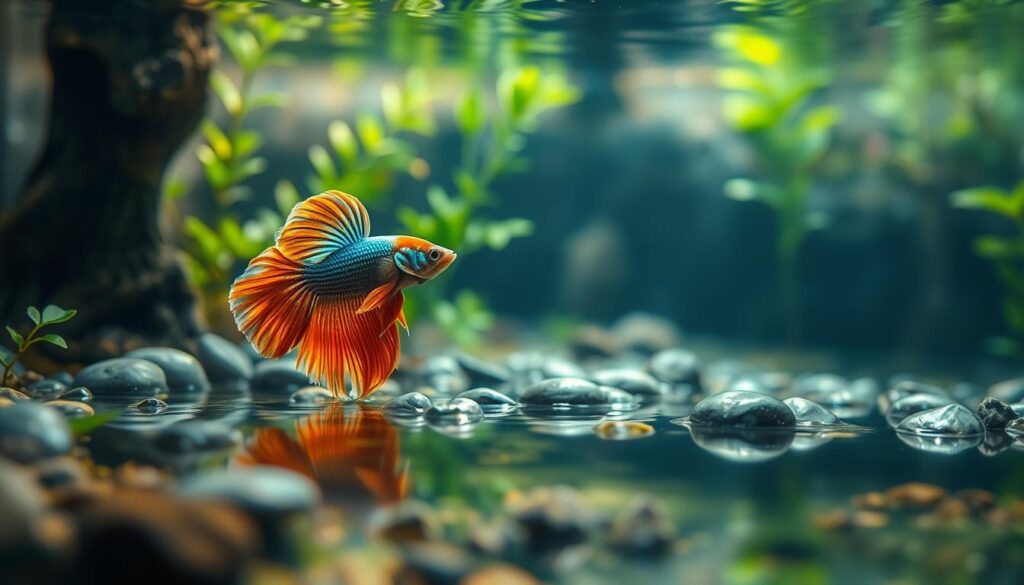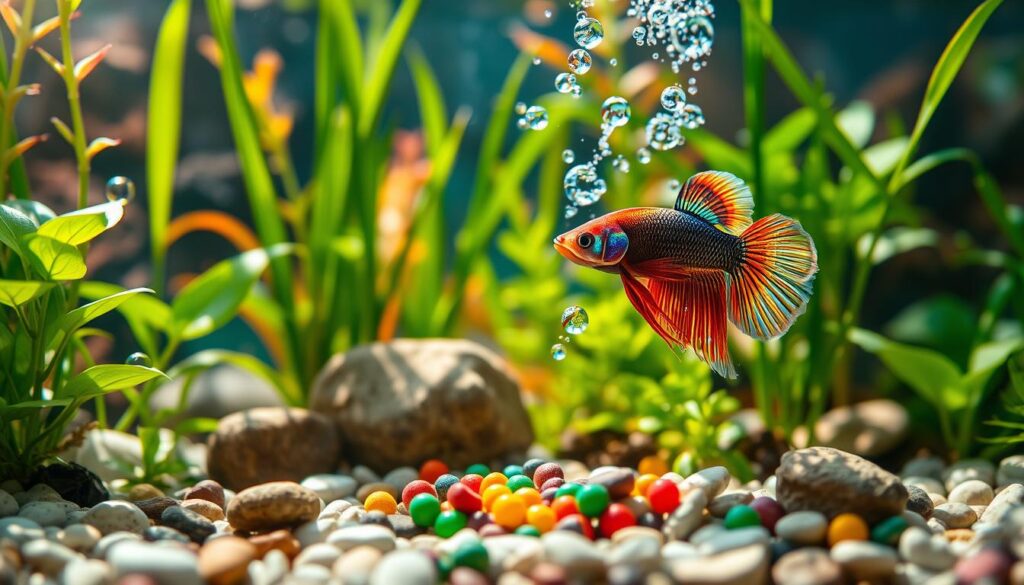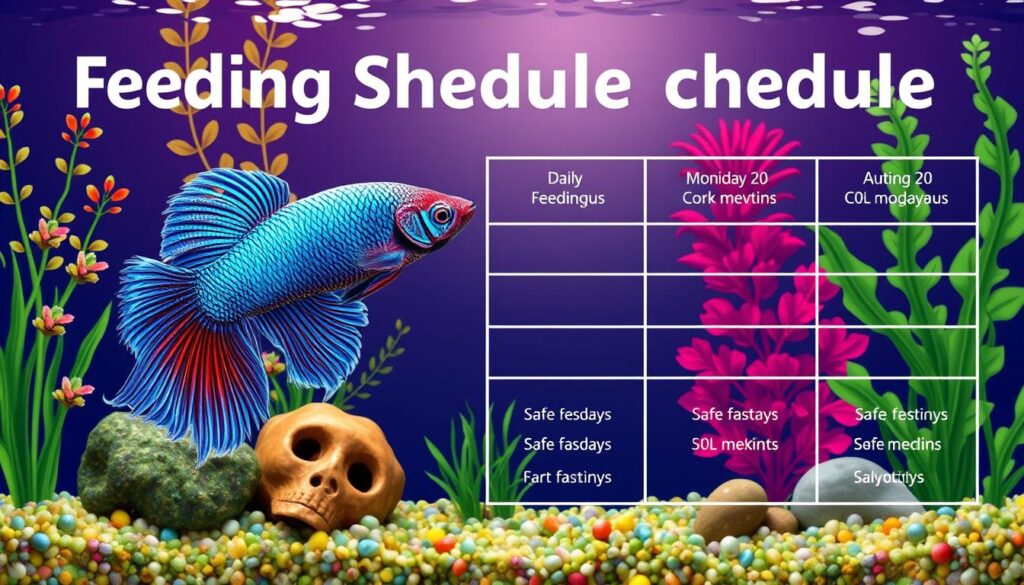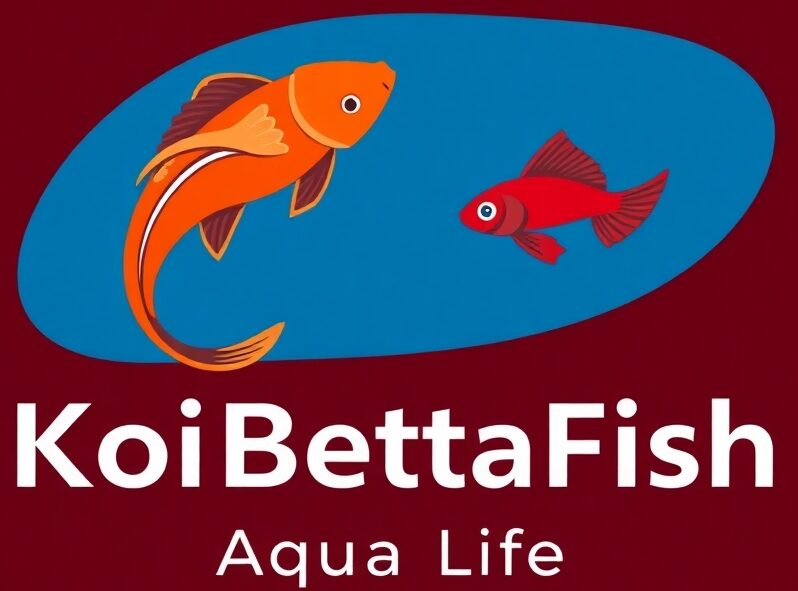Hey there, fellow pet owners! Today, we’re exploring a question that’s on everyone’s mind – how long can a betta fish go without food? You might be surprised to learn that betta fish can live up to 2 weeks without eating. But, this is not good for them as it can cause stress, disease, and even organ failure. So, what’s the right amount of time for a betta fish to go without food? Let’s find out!
As we look into how long a betta fish can survive without food, we’ll see why regular feeding is key. The answer to how long a betta fish can go without food varies. It depends on the fish’s age, size, and health. But one thing is clear – betta fish need food to stay healthy, and ignoring their diet can be very harmful.
Key Takeaways
- Betta fish can survive for up to 2 weeks without food, but this is not recommended.
- The maximum recommended time for a betta fish to go without feeding is 4-7 days.
- Betta fish typically need to be fed 2 to 3 times per day for optimal health.
- Maintaining proper water quality and temperature is essential for keeping the fish healthy during owner absence.
- A lack of regular feeding can result in betta fish becoming lethargic and entering ‘starvation mode’.
- Automatic fish feeders are recommended for maintaining feeding schedules during owner absences, even for vacations longer than a week.
- Betta fish can go without food for up to 3 days without significant harm, but after 5 days without food, they may experience increased stress levels.
The Maximum Survival Time of Betta Fish Without Food
Wondering how long your betta fish can live without food? We’ve got the answer! Betta fish can usually survive for up to 3 days without eating, given the right conditions. But, after about 4 to 5 days, their body starts using stored energy. It’s important to know that fasting for too long can stress them out and even harm their kidneys and organs.
When it comes to betta fish care food schedule, age and health matter a lot. Healthy betta fish can last a few days without food, but sick or underweight ones might not make it. A good betta fish feeding routine is key to keeping them healthy and happy. And, don’t forget, a balanced diet is crucial for their well-being.
Here are some key factors to consider when determining the maximum survival time of your betta fish without food:
- Age: Healthy adult betta fish can survive for up to 2 weeks without food, while young and elderly betta fish have different survival periods.
- Health: Fish that are underweight or unhealthy may not survive as long without food.
- Environment: Optimal water conditions and a large, fully cycled tank can increase survival chances.
-
Also Read
How to Maintain Acceptable Total Gas Pressure in Your Freshwater Aquarium
By understanding these factors and planning a suitable betta fish care food schedule, you can ensure your fish stays healthy and happy, even when you’re away. Remember, it’s always better to err on the side of caution and provide your betta fish with a nutritious diet and a comfortable environment.
Best Betta Fish Food Click Here
Factors Affecting How Long Betta Fish Can Survive Without Food
When it comes to betta fish fasting period, several factors come into play. You might be wondering, what affects how long your betta fish can survive without food? Well, let’s dive into it! Betta fish health and diet play a significant role in determining their survival period without food. For instance, a betta fish that is well-fed and healthy can survive for a longer period than one that is malnourished.
A betta fish’s hunger tolerance is also influenced by factors such as water temperature, tank size, and filtration. Did you know that water temperature can affect your betta fish’s metabolism and appetite? It’s true! A stable water temperature between 75-80 degrees Fahrenheit is ideal for betta fish. Here are some key factors to consider:
- Tank size: A minimum tank size of 5 gallons is recommended for betta fish to thrive.
- Water temperature: A stable water temperature between 75-80 degrees Fahrenheit is ideal.
- Filtration: Proper filtration is essential to maintain clean and healthy water.

By understanding these factors, you can create a healthy environment for your betta fish and ensure they thrive, even during periods of fasting. Remember, a happy and healthy betta fish is a well-cared-for betta fish!
| Factor | Effect on Betta Fish |
|---|---|
| Tank size | Affects water quality and availability of food |
| Water temperature | Influences metabolism and appetite |
| Filtration | Maintains clean and healthy water |
Also Read10 Betta Fish Diseases You Need to Watch Out For in Your Aquarium
Signs Your Betta Fish Is Actually Hungry
As a responsible pet owner, you want to make sure your betta fish is fed well and healthy. But how do you know if your betta fish is hungry? We’ll look at the signs of hunger in betta fish, including physical signs, changes in behavior, and signs of malnutrition.
When it comes to betta fish care and feeding, it’s key to recognize hunger signs. Betta fish nutrition and health are closely tied. A well-fed betta fish is happy and healthy.
Physical Indicators of Hunger
Some physical signs of hunger in betta fish include:
- Loss of weight or a sunken belly
- Pale or dull coloration
- Slow or lethargic movement
These signs mean your betta fish might not be getting enough food. It’s important to adjust their feeding schedule to avoid betta fish food deprivation effects.

Behavioral Changes During Fasting
Betta fish may show behavioral changes when they’re hungry, such as:
- Increased activity or restlessness
- Swimming near the surface of the water
- Searching for food in the gravel or decorations
These changes can mean your betta fish is hungry and needs to eat. By noticing these signs, you can give your pet the best care. This ensures their betta fish nutrition and health needs are met.
Also Read DeepSeek AI: Revolutionizing Betta Fish Care and Aquarium Management
Safe Feeding Breaks for Betta Fish
When it comes to betta fish care and maintenance, feeding is key. Sometimes, you might need to take a break from feeding. That’s where safe feeding breaks come in. You can use automatic feeders or vacation feeders to keep your betta fish fed and healthy, even when you’re away.
Automatic feeders make it easy to keep a betta fish feeding schedule. They can be set to feed your betta fish at regular times. This way, your betta fish gets fed on time, even when you’re not there. Vacation feeders are also great for safe feeding breaks.
Think about betta fish food and nutrition when planning a break. Pick a high-quality food that’s good for your betta fish. Make sure the feeder has enough food for your break.

- Choose a reliable automatic feeder or vacation feeder
- Program the feeder to dispense food at set intervals
- Select a high-quality food that meets your betta fish’s nutritional needs
- Ensure the feeder is filled with enough food to last the duration of your break
By following these tips, your betta fish will stay well-fed and healthy, even when you’re away. Always remember to prioritize betta fish care and maintenance to keep your pet happy and thriving.
| Feeder Type | Benefits | Drawbacks |
|---|---|---|
| Automatic Feeder | Convenient, consistent feeding | May malfunction, expensive |
| Vacation Feeder | Easy to use, affordable | May not provide consistent feeding |
Preparing Your Betta Fish for Extended Periods Without Food
Are you going on vacation and worried about your betta fish? We’ve got you covered! It’s important to prepare your betta fish for when you’re away. A good plan for betta fish feeding and nutrition is key to their health.
Pre-vacation Feeding Schedule
Creating a pre-vacation feeding schedule can help. It reduces stress and prevents overfeeding. Here are some tips:
- Feed your betta fish 2-3 times a day, only as much as they can eat in 2 minutes
- Avoid overfeeding to prevent digestive issues and poor water quality
- Consider using a fish feeder to automate feeding
Tank Preparation Tips
Preparing your tank for when you’re away is also crucial. Here are some tips:
- Do regular water changes to keep the water quality good
- Check water parameters like pH, ammonia, and nitrate levels
- Think about adding a water conditioner to remove chlorine and chloramines
Alternative Feeding Solutions
If you’re away for a long time, consider these feeding solutions:
- Automatic fish feeders
- Vacation feeders that release food slowly
- Hiring a pet sitter to feed your betta fish
-
Also Read TOP 10 MOST POPULAR BETTA FISH
Health Impacts of Food Deprivation on Betta Fish
Understanding the health effects of not feeding betta fish is key to their care. Betta fish health and diet are very connected. Not giving them enough food can cause serious problems. They can live without food for up to two weeks, but it stresses them out and makes them sick.
So, what happens if betta fish don’t eat enough? Here are some important points:
- Stress and disease: Not eating can stress betta fish, weakening their immune system and making them sick.
- Lethargy and weakness: Without food, betta fish get tired and weak. They become less active and more likely to get sick.
- Organ failure: If they don’t eat for a long time, their organs can fail. This is very dangerous for betta fish.
To keep your betta fish healthy, feed them well and keep their environment clean. Regular water changes, a balanced diet, and the right temperature are important. By doing these things, you can help your betta fish live a long and happy life.
Remember, taking care of betta fish nutrition and wellness is very important. By focusing on their health, you can make a great home for them to grow and thrive.
| Health Impact | Description |
|---|---|
| Stress and disease | Not eating can stress betta fish, weakening their immune system and making them sick. |
| Lethargy and weakness | Without food, betta fish get tired and weak. They become less active and more likely to get sick. |
| Organ failure | If they don’t eat for a long time, their organs can fail. This is very dangerous for betta fish. |
Common Mistakes When Leaving Betta Fish Without Food
When caring for betta fish, it’s important to avoid common mistakes. One key area is feeding them the right amount. Overfeeding can cause constipation, which is harmful.
A good environment with microorganisms helps your betta fish survive fasting. But, using vacation feeders wrong and temperature issues can harm them. Proper tank conditions are crucial for their health.
Some common mistakes include:
- Overfeeding before you leave, which can pollute the water and stress your betta fish
- Improper use of vacation feeders, leading to over or underfeeding
- Temperature control issues, causing stress and health problems
Knowing these mistakes helps you provide better care for your betta fish, even when you’re away. Keep an eye on their food intake and adjust their feeding schedule. This ensures they get the best care possible.
Emergency Food Sources for Betta Fish
Hey there, fellow betta fish enthusiasts! Sometimes, life gets busy and you can’t get to the pet store. That’s why we’re sharing some emergency food sources to keep your betta fish happy and healthy.
When it comes to betta fish food and nutrition, a balanced diet is key. In emergencies, frozen or live foods can be a good substitute. These foods are packed with nutrients to keep your betta fish thriving.
Some examples of emergency food sources for betta fish include:
- Frozen brine shrimp
- Frozen bloodworms
- Live daphnia
These foods are easy to find and can be stored in your freezer or fridge. Just remember to follow the proper feeding guidelines to avoid overfeeding your betta fish.
Having an emergency food plan ensures your betta fish gets the betta fish care and maintenance they need. With a little planning, you can also prevent betta fish health and wellness issues from inadequate nutrition.
Conclusion: Best Practices for Feeding Your Betta Fish
As we finish our look at how long betta fish can go without food, it’s clear that good betta fish care and feeding is key. Knowing what your betta needs for betta fish nutrition and health and how to keep them well is important. This way, you can give your betta the care they need.
While betta fish can handle fasting, a balanced diet and a clean home are crucial for their health. Keep a regular feeding schedule, watch your betta’s behavior, and quickly fix any hunger or malnutrition issues. These steps will help you care for your betta fish well.
So, let’s toast to happy, healthy betta fish! By following the advice in this article, you can make a great home for your fish. Enjoy their colors and fun personalities for many years.

